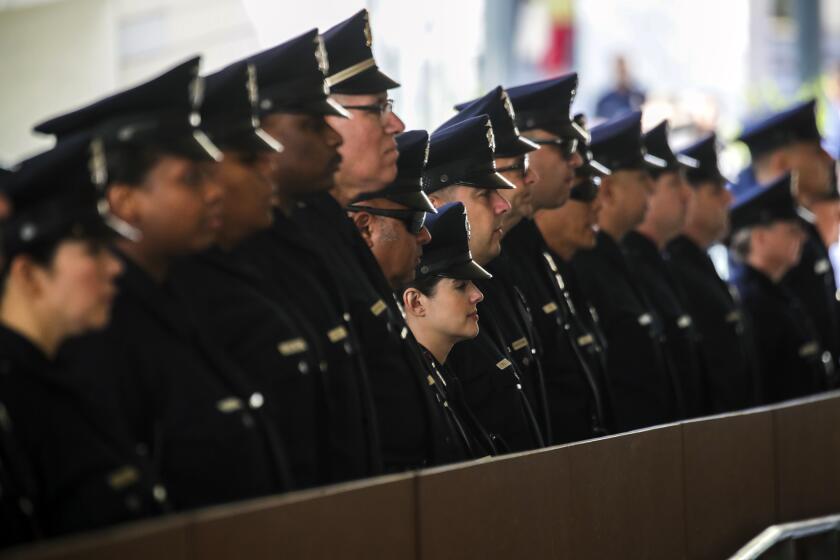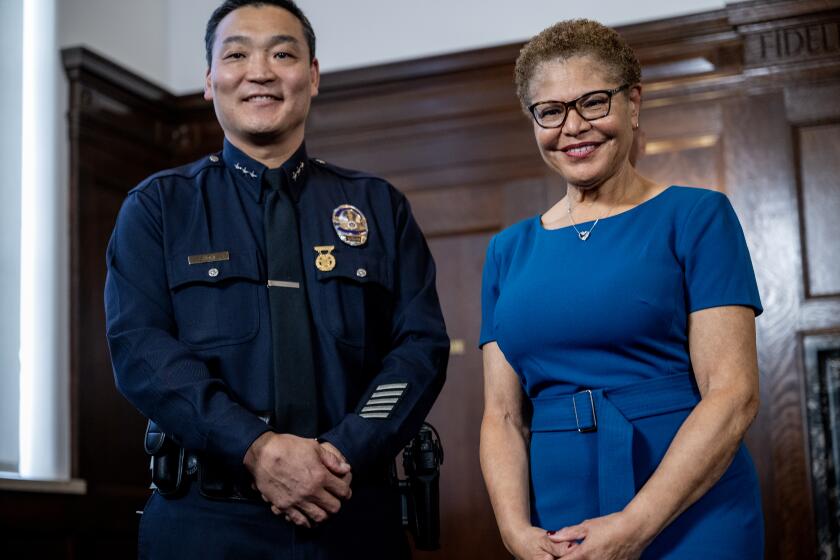Editorial: Mayor Bass vetoed a police discipline ballot measure. Now she has to help create a new one

- Share via
Mayor Karen Bass took the unusual step this week of vetoing a proposed November ballot measure to rework the disciplinary process for Los Angeles police officers. Assuming the City Council doesn’t override her veto, the mayor’s decision means voters won’t get to consider police accountability this year.
OK. But, if Angelenos are going to get a do-over on police reform, Bass and the City Council need to use the next two years to develop a stronger proposal that increases both the public’s confidence that officers will be held accountable for misconduct and officers’ confidence that they will be treated fairly. And they should not wait until just weeks before the deadline for the 2026 ballot. Although city leaders had seven years to plan a well-crafted reform proposal, the council put it off until the last minute and produced a rushed one.
The details of LAPD discipline reform should have been worked out months before the ballot deadline, but City Hall has kept wrangling up to the last minute.
The reforms in the November ballot measure weren’t terrible, just underwhelming. It would have allowed the police chief to fire officers accused of some types of misconduct and rejiggered the composition of the department’s three-member Board of Rights disciplinary panels. And it would have created a binding arbitration process as a final level of appeal. Together, they were half-steps forward but far short of what’s needed.
Still, there were significant disagreements over the details of the proposal, including whether the changes would ultimately strengthen the discipline system or result in even more lenient penalties in some cases. And the process was so rushed in the days leading up to the deadline to put the measure on the ballot, that there was little time for advocates and experts to weigh in. Bass, in her veto letter, sided with the skeptics, saying the proposed measure “risks creating bureaucratic confusion” in the Los Angeles Police Department.
It’s important to get police reform right this time because the City Council has bamboozled the public before.
The LAPD’s Board of Rights hearings have long been the weak link in officer discipline. The City Council has another chance to fix the problem.
In 2017, the council, on behalf of the union that represents rank-and-file officers, approved a ballot measure that significantly weakened the discipline process. Voters were fooled into believing they were toughening police discipline by permitting Boards of Rights to consist of three civilians, instead of one civilian and two police officers. They may have figured civilians would be harder on cops accused of wrongdoing, but they had it backward.
As a result, the police chief is often unable to fire officers who have committed serious misconduct. Some are considered so tainted by dishonesty or unreliability that they can’t testify in court without undermining the case, and are assigned to non-law-enforcement positions that should be filled by less costly civilians. The LAPD has nearly 70 officers on its payroll that the chief would have fired if he’d been allowed to do so, the LAPD estimates.
Mayor Karen Bass needs an incisive assessment of the challenges that await a new chief, not a status-quo LAPD leadership transition.
After the passage of Charter Amendment C in 2017, council leaders promised a sweeping reexamination and overhaul of police practices and policies, including the discipline system. That never happened.
Bass must do better than past city leaders. She has a long history of observing and critiquing the LAPD. Now she has a once-in-a-generation opportunity to transform the department. She’s expected to select a new police chief this fall, and other top positions need to be filled as well. Fixing the broken police discipline system so the next chief isn’t hindered by its inadequacies should be central to that transformation.
The development of the discipline ballot measure was led by Council members Tim McOsker and Hugo Soto-Martínez, but this work is too important for the mayor to stay on the sidelines. Now that she’s vetoed the first proposal, Bass should take a public leadership role in developing a more comprehensive reform package that reflects her vision for a safer, more just city.
More to Read
A cure for the common opinion
Get thought-provoking perspectives with our weekly newsletter.
You may occasionally receive promotional content from the Los Angeles Times.













